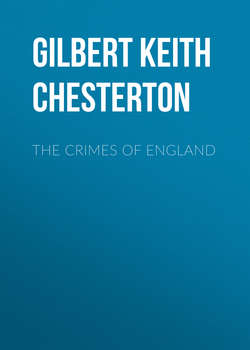Читать книгу The Crimes of England - Гилберт Честертон, Gilbert Keith Chesterton, Лорд Дансени - Страница 3
III —The Enigma of Waterloo
ОглавлениеThat great Englishman Charles Fox, who was as national as Nelson, went to his death with the firm conviction that England had made Napoleon. He did not mean, of course, that any other Italian gunner would have done just as well; but he did mean that by forcing the French back on their guns, as it were, we had made their chief gunner necessarily their chief citizen. Had the French Republic been left alone, it would probably have followed the example of most other ideal experiments; and praised peace along with progress and equality. It would almost certainly have eyed with the coldest suspicion any adventurer who appeared likely to substitute his personality for the pure impersonality of the Sovereign People; and would have considered it the very flower of republican chastity to provide a Brutus for such a Caesar. But if it was undesirable that equality should be threatened by a citizen, it was intolerable that it should be simply forbidden by a foreigner. If France could not put up with French soldiers she would very soon have to put up with Austrian soldiers; and it would be absurd if, having decided to rely on soldiering, she had hampered the best French soldier even on the ground that he was not French. So that whether we regard Napoleon as a hero rushing to the country's help, or a tyrant profiting by the country's extremity, it is equally clear that those who made the war made the war-lord; and those who tried to destroy the Republic were those who created the Empire. So, at least, Fox argued against that much less English prig who would have called him unpatriotic; and he threw the blame upon Pitt's Government for having joined the anti-French alliance, and so tipped up the scale in favour of a military France. But whether he was right or no, he would have been the readiest to admit that England was not the first to fly at the throat of the young Republic. Something in Europe much vaster and vaguer had from the first stirred against it. What was it then that first made war – and made Napoleon? There is only one possible answer: the Germans. This is the second act of our drama of the degradation of England to the level of Germany. And it has this very important development; that Germany means by this time all the Germans, just as it does to-day. The savagery of Prussia and the stupidity of Austria are now combined. Mercilessness and muddleheadedness are met together; unrighteousness and unreasonableness have kissed each other; and the tempter and the tempted are agreed. The great and good Maria Theresa was already old. She had a son who was a philosopher of the school of Frederick; also a daughter who was more fortunate, for she was guillotined. It was natural, no doubt, that her brother and relatives should disapprove of the incident; but it occurred long after the whole Germanic power had been hurled against the new Republic. Louis XVI. himself was still alive and nominally ruling when the first pressure came from Prussia and Austria, demanding that the trend of the French emancipation should be reversed. It is impossible to deny, therefore, that what the united Germanics were resolved to destroy was the reform and not even the Revolution. The part which Joseph of Austria played in the matter is symbolic. For he was what is called an enlightened despot, which is the worst kind of despot. He was as irreligious as Frederick the Great, but not so disgusting or amusing. The old and kindly Austrian family, of which Maria Theresa was the affectionate mother, and Marie Antoinette the rather uneducated daughter, was already superseded and summed up by a rather dried-up young man self-schooled to a Prussian efficiency. The needle is already veering northward. Prussia is already beginning to be the captain of the Germanics "in shining armour." Austria is already becoming a loyal sekundant.
But there still remains one great difference between Austria and Prussia which developed more and more as the energy of the young Napoleon was driven like a wedge between them. The difference can be most shortly stated by saying that Austria did, in some blundering and barbaric way, care for Europe; but Prussia cared for nothing but Prussia. Austria is not a nation; you cannot really find Austria on the map. But Austria is a kind of Empire; a Holy Roman Empire that never came, an expanding and contracting-dream. It does feel itself, in a vague patriarchal way, the leader, not of a nation, but of nations. It is like some dying Emperor of Rome in the decline; who should admit that the legions had been withdrawn from Britain or from Parthia, but would feel it as fundamentally natural that they should have been there, as in Sicily or Southern Gaul. I would not assert that the aged Francis Joseph imagines that he is Emperor of Scotland or of Denmark; but I should guess that he retains some notion that if he did rule both the Scots and the Danes, it would not be more incongruous than his ruling both the Hungarians and the Poles. This cosmopolitanism of Austria has in it a kind of shadow of responsibility for Christendom. And it was this that made the difference between its proceedings and those of the purely selfish adventurer from the north, the wild dog of Pomerania.
